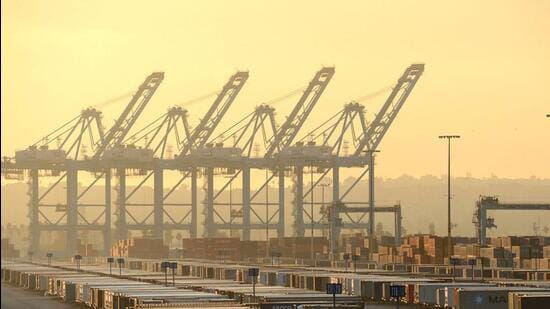Our Terms & Conditions | Our Privacy Policy
India-EU FTA: 9th round of negotiations to start on September 23 | Latest News India
India will raise concerns of its stakeholders about the European Union’s move to impose unequitable sustainability regulations — labour standards, deforestation rules and carbon tax — at the five-day free trade talk starting Monday because such stringent measures would hamper Indian exports to the EU and make its small and medium enterprises uncompetitive, people aware of the development said.
Core FTA issues include trade in goods and services, digital trade, investment protection, procurement and IPRs. (AFP)
The ninth round of India-EU free trade agreement talks, which starts on Monday in the Indian capital, will also discuss “concerns over sustainability measures” along with “core” trade issues, said the people cited above, requesting anonymity. Core issues on the negotiating table include trade in goods and services, digital trade, investment protection, government procurement and intellectual property rights (IPRs), they added.
Some progress has been made on certain issues related to trade and sustainable development, for example, gender equality where both partners and by and large agree. Other sustainability measures of EU are, however, detrimental for the Indian interests, particularly for its micro, small and medium enterprises (MSMEs), the first person said.
“Trade negotiations must be based on the principle of equity. The EU cannot treat the developing Indian economy at par with developed economies and expect it to follow stringent and costly environmental measures,” he said. HT on August 26 reported that India will simultaneously discuss sustainability measures such as the Carbon Border Adjustment Mechanism (CBAM) and EU deforestation regulation (EUDR) with the 27-nation bloc in the ninth round of FTA talks. The two partners have already completed eight rounds of talks (held on June 24-28 in Brussels), leading to the conclusion of two chapters so far — one on small and medium enterprises and the other on sustainable food systems.
According to a report released in July this year by independent think tank Centre for Science and Environment (CSE), the carbon tax burden for India is estimated to be the equivalent of 0.05% of its gross domestic product. The EU is India’s second-biggest export destination with about $76 billion of merchandise exports in 2023-24. It imported goods worth more than $59 billion that year.
The Indian side believes CBAM is a form of tax that can lead to tariffs of up to 35% on imports of high-carbon goods such as cement, aluminium, fertilisers, chemicals including hydrogen, iron and steel from India. CBAM will be levied on carbon intensive products to offset “carbon leakage” by importing high-carbon goods. Carbon leakage occurs when firms in the EU move carbon-intensive production abroad to countries, where less stringent climate policies are in place, or when EU products get replaced by more carbon-intensive imports. The tax is being implemented in phases from October 2023 and will become fully effective from January 2026.
EUDR or the regulation on deforestation-free products covers production of commodities such as cattle, wood, cocoa, soy, palm oil, coffee, rubber and some of their derived products such as leather, chocolate, tyres and furniture. This demands certification from importers to prove their products didn’t originate from recently deforested land or contributed to forest degradation. EUDR will start to apply from December 30 this year.
India is committed to environmental protection and sustainability, but it is against making instruments such as EUDR and CBAM becoming part of trade commitments because these are perceived as instruments of protectionism and act as non-tariff barriers (NTBs), said the people cited above.
Images are for reference only.Images and contents gathered automatic from google or 3rd party sources.All rights on the images and contents are with their legal original owners.



Comments are closed.